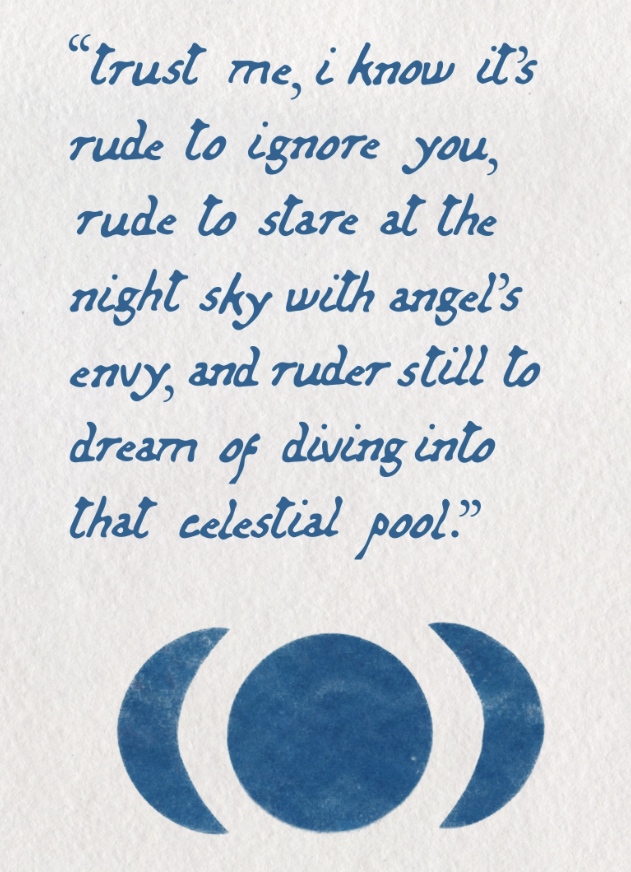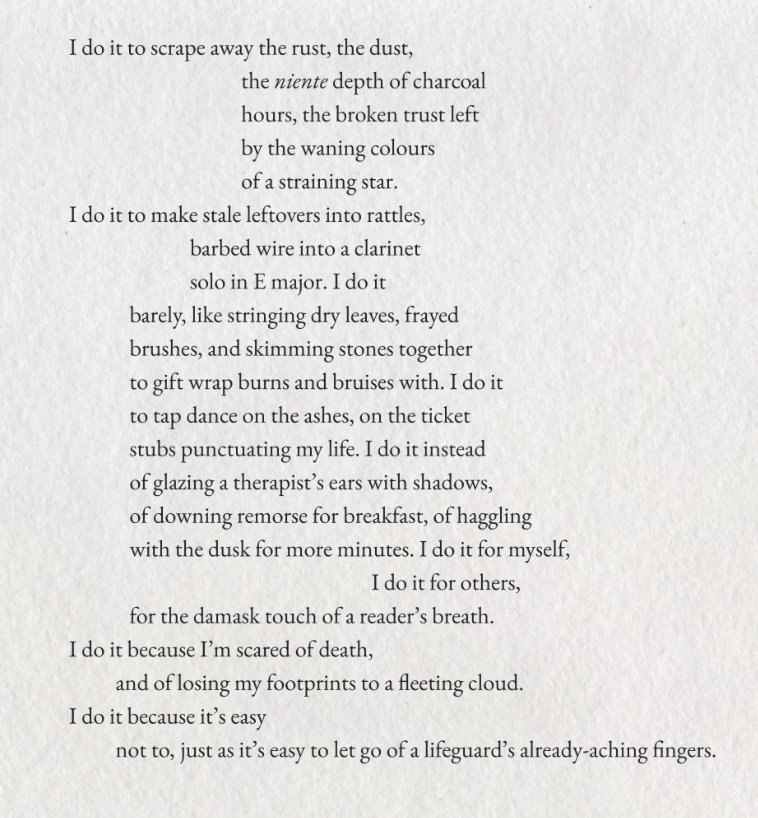The Catch
February 2025 Newsletter
Introduction
Welcome to our first newsletter of the new year! For February, our “catch of the month” is a sardine. While birds became our aesthetic last year, we have decided to switch to what many birds love the most—fish.
The month of February has associations with different types of love, and like love, sardines can either be positive or negative depending on the context. Sardines are known to symbolize abundance and luck. On the other hand, sardines are often depicted indistinctively packed together in a tin, which creates a more negative association to feeling overcrowded and small. They are a simple food source yet can be very nutritious.
This edition of “The Catch” includes two interviews with contributors to our latest issue, Blued Reverie. Enjoy reading these insightful responses from poets Abbie Doll and Evita Arakelian.
Talon Update
Thank you all who attended our latest open mic night! Our next open mic will be held on April 22nd along with the Wainwright awards. Make sure to check our social media page @talon_review and the website for updates as we get closer to the event.
Also, submissions for our next issue are open now and close on Friday, March 7th. Submit your creative pieces using the link below:
Reclaiming the Moon :
An Interview with Abbie Doll
Author Introduction:
Abbie Doll is a writer residing in Columbus, OH with an MFA from Lindenwood University and is a Fiction Editor at Identity Theory. Her work has been featured in Door Is a Jar Magazine, 3:AM Magazine, and Pinch Journal Online, among others. Connect on socials @AbbieDollWrites.
In our previous issue, Blued Reverie, Abbie Doll contributed a piece titled “moonlit mania.” Read the full piece and interview below:
Interview Transcript:
Talon: We, the editors, have our own interpretations and readings of the contributions we receive. But we are always fascinated with hearing the author’s intentions. What was your “purpose” behind this piece, if any?
Doll: Poets get a bad rap for obsessing over the moon. Everyone loves to say that the topic is overdone; cliché; taboo, even. But, I don’t feel that way. I still get flush with awe whenever I see her, so I set out to make this reclamation of sorts.
Talon: What sparked the idea for this contribution, and how did you know that you had some good dough to work with when the idea came to you?
Doll: I wanted to marry one cliché with another, figured I might as well go all in. The bad first-date situation felt like a fitting opportunity to allow this narrator to chase after her moon-based fantasies.
Talon: What was the writing process like for this piece? Did it come easily, or was it more challenging?
Doll: This one came pretty easily once I leaned into the unraveling and the mismatched nature of the pairings here. I tried to make the language as celestial, spiritual, and moonlike as possible to contrast with this myopic and all-too-grounded man.
Talon: Our editors and readers are always asking that same old question: how do you push through “writer’s block”? How do you keep going when you are at a loss for words?
Doll: When I start to feel like I don’t have much to say, I take a break and turn toward reading (poetry in particular). If you’re just sitting there resenting the lack of output, it’s tough to get the flow going again. But if you shift the focus and get invested in the words someone else has taken the time and effort to arrange, you might stumble upon an unexpected pocket of inspiration.
Talon: At Talon, we value the careful and precise decisions behind word choice, shape, and structure. What elements are you particularly proud of for this piece?
Doll: I tried to jam-pack this one with feelings of wholeness to contrast the ending’s inevitable separation; I wanted to emphasize the notion that loss is an inevitable component of love. So much of the imagery refers to the moon, at least loosely: the bald head, the mop bucket, the pool, the black hole, the womb.
Talon: Does this piece align with any of your past work, or do you plan on exploring these topics and themes in the future?
Doll: I’m sure I’ll come back to the moon, at least tangentially; she’s a tough one to ignore. Stylistically, this piece is similar to other instances of my prose; I tend to get lost in the process of getting the language to mirror or complement the subject matter at hand.
Talon: Are there any other projects you would like to promote here?
Doll: I’m hoping to get a manuscript out there soon, but no big projects to announce yet. If anyone wants to connect, I’m @AbbieDollWrites on Bluesky, Twitter/X, Instagram, and Facebook. Thanks for the read!
Why She Writes:
An Interview with Evita Arakelian
Author Introduction:
Evita Arakelian has had her poetry published in several literary journals, including ‘A New Ulster’, ‘Pulp Poets Press’, 'Eunoia Press', 'Westward Quarterly', 'Sparks of Calliope', 'Off The Coast', and ‘Grand Little Things’. Her poem ‘The Memory of a Star’ has been nominated for the 2022 Pushcart Prize and Best of the Net Anthology. She holds a Master’s degree in Creative Writing. She has moderated a number of Creative Writing workshops in Yerevan, and performed her poetry in numerous venues, winning the 'Square Performer of the Year' accolade for the performance of her poetry in the 2023 'One Square Meter' festival hosted by the Armenian Center for Creative and Experimental Art.
For Blued Reverie, Evita Arakelian contributed her poem “Why I Write.” Read the full piece and interview below:
Interview Transcript:
Talon: We, the editors, have our own interpretations and readings of the contributions we receive. But we are always fascinated with hearing the author’s intentions. What was your “purpose” behind this piece, if any?
Arakelian: I would say that my main purpose was exploring—and at some point expressing—my yearning to write poetry, what writing poetry means to me, and why it is such a significant part of my life.
Talon: What sparked the idea for this contribution, and how did you know that you had some good dough to work with when the idea came to you?
Arakelian: I was working on coming up with a manifesto when I wrote this poem, actually. I had accepted a peer’s challenge to write a manifesto as a writing exercise. That’s when I thought of Shklovky’s statement that “art exists so that one may recover the sensation of life…to make the stone stony” (as stated in his 1917 essay “Art As Technique”). This inspired the first few lines, which in turn helped initiate the chain of images and ideas that later became the poem. I made a mind map of possible semantic fields I’d explore, and the images I would use to communicate the difficulty and necessity of writing poetry. Once I was convinced that my “lump in the throat” (to quote Robert Frost) was big enough, I knew I’d be able to complete the poem.
Talon: What was the writing process like for this piece? Did it come easily, or was it more challenging?
Arakelian: The writing process was relatively easy, as I managed to complete the first draft in one sitting. The ending, however, was a major challenge to get right. I wrote three different endings, and met with the same feedback: they weren’t packing enough of a punch! I’m really grateful to the wonderful writers (my creative writing professor, Professor Daniel Bennett included) who pointed this out, because otherwise I may have never managed to communicate my approach to writing poetry as a condition of my existence.
Talon: Our editors and readers are always asking that same old question: how do you push through “writer’s block”? How do you keep going when you are at a loss for words?
Arakelian: I’ll confess right from the beginning that overcoming “writer’s block” is one of the hardest things I keep having to do. I have come up with a number of rules for myself over the years, however, which usually help me waddle through it.
The first rule for me is to keep writing, writing, writing. I start writing (whether I’m at my desk, in the dentist’s waiting room, or in a taxi) by promising myself that I’ll never ever (ever!) show that writing to anyone. I promise myself that even I don’t have to read it later on unless I absolutely want to. I do freewriting exercises with this mindset. If I don’t find any potential in what I’ve produced, I go back to my writer’s notebook (a compilation of months and months of raw ideas, images, interesting words, etc.) and try to work with that.
The second rule is that I read even more than I usually do when I get stuck. And not just poetry. News articles, short stories, ads, jokes, anything I have at hand, really. And the third rule is self compassion, because most of the time I find myself in a rut not because I don’t have any ideas, but because I doubt my ability to explore those ideas well enough as a poet. This rule usually involves me going through the positive feedback I’ve received during workshops, in forums, in writers’ groups (I make a point of recording the feedback I get as accurately as possible). And so I remind myself of what I’ve done right at different points in my writing journey. I’ll admit that thinking about my published poems is also quite a validating experience!
Talon: At Talon, we value the careful and precise decisions behind word choice, shape, and structure. What elements are you particularly proud of for this piece?
Arakelian: I’d say I’m mainly proud of two things. One of them is the tension between the stubbornly repeated “I do it” and the layout of the poem which, like a turbulent body of water, keeps hurling the repeated clause around. So I’d say the expressive potential of the mise-en-page is one thing I quite like. The other (albeit small) element I’m proud of in the poem is the double syntax in the penultimate line: “I do it because it’s easy | not to.” I think it can in many ways be quite a surprising moment for readers, who may find themselves wondering why anyone would bother writing a whole poem about writing itself if it is so “easy” — only to have their initial reading reversed by the last line.
Talon: Does this piece align with any of your past work, or do you plan on exploring these topics and themes in the future?
Arakelian: I couldn’t claim that this poem is the first of its kind in terms of this or that, I’m afraid. It is, however, one of my first few poems to experiment with the synthesis of white space, fast-paced imagery, and overtly foregrounded musicality.
I’d say I am deeply invested in exploring self-referential poems and the very act of writing poetry in the future, as well.
Talon: Are there any other projects you would like to promote here?
Arakelian: Not at the moment. I am currently adding the finishing touches to my debut collection and going through the final rounds of edits before submitting it to different publications. Fingers crossed!







